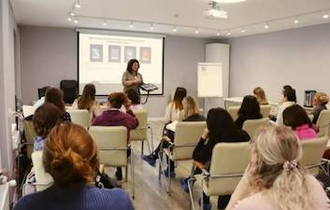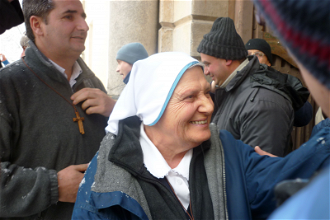Russia: Caritas St Petersburg offers support to escape addictions

Source: Fides
Caritas St Petersburg, led by Dr Natalia Anatolevna Pevtsova, was founded in 1993 and has been offering practical help to those in need and training programs for professionals and volunteers for more than 30 years. The association currently runs a dozen assistance programs that provide support to the poor, mothers in need, teenagers, young people, mentally ill adults, the homeless and lonely elderly people.
Recently, thanks to funding from the Presidential Grants Foundation (Fond prezidentskich grantov), a cycle of six video lectures on the problem of alcohol and drug addiction, produced by the Information and Addiction Counseling Center, has been available for free on the YouTube channel Caritas St Petersburg.
The Centre was founded in 2007 after the employees and volunteers reasied they were meeting a large number of people suffering with serious addictions.
Thanks to the support of the German Caritas and the Renovabis Foundation, the Center became a reality in 2010. On September 1st of the same year, free lecture series (initially with five lectures, and for several years with six lectures) were launched, which are intended to inform not only those who are personally affected by the addiction problem, but also those in their own families - or friends struggling with this problem.
During the lectures the process of developing addiction, the problems caused by fetal alcohol syndrome, the problems of people living with addicts and the risks for minors living in a family environment with one or more addicts is explained. The average number of participants is around 30 people, while the number of online accesses has exceeded 2,000 within a few days.
"These are numbers that will continue to rise," says the Center's director, psychologist Dr Radik Galiyakhmetov. He said: "During the lessons we ensure that the person can get to know some aspects of themselves better and recognize the role of alcohol or other substances in their life. Among the different psychologists who take turns, those interested can choose the one you feel lost compfortable with and book an individual consultation."
The Center offers 36 hours a week of individual counseling and several hours of work in small groups. "Everyone has the opportunity to arrange five free individual consultations, which will serve to raise the person's awareness of their addiction and, if they agree, to find the right treatment path for their needs. As soon as we open enrolment, the appointments are fully booked within a few days. This means that we have achieved our goal: we have actually become that 'little bridge' that connects the person in need with the place that can heal them."
Also fundamental was the push by Dr Galiyakhmetov. and his colleagues at Caritas to network numerous Russian specialists in the field of pathological addiction treatment in order to try to find a viable path to rehabilitation even for the most complex cases that require multiple expert opinions.
Dr Galyakhmetov said: "Often people come to us because they are urged by a relative or a priest, but they do not see their addiction or do not want to see it. I remember a woman who came to me in November 2010 came: She had lost her job because she was an alcoholic, but didn't accept that she was. During the counseling session I was unable to make her aware of the problem, but before she left I asked her to keep a diary and wrote down each day how much she planned to drink and how much she actually drank. Two months later she came back to me with the diary and said she had realized she was an alcoholic and agreed to start a detox program. She recovered within a year and has not relapsed since. Often the hardest part is agreeing to treatment, but it is possible to leave."
The work that began in 2010 has enabled the team of psychologists to identify in the personal histories of numerous subjects the coexistence of pathological addiction, with episodes of violence and/or psychological abuse suffered. Thanks to the support of the Caritas Germany and the Renovabis Foundation, since 2014 the Center has also launched a cycle of two free meetings per month on the topic of violence, in which an average of around 60 people take part.
Dr Galiyakhmetov said: "The violence experienced is a breeding ground for the development of various types of addictions. Whether physical, sexual, psychological or conscience abuse, it leaves very deep wounds on those affected, who are often unaware that they are victims for many years. Some come to us in such a state that we can no longer refer them to treatment: they have used up their last strength to come to the center, they have put their last bit of trust in us. In these cases, we accept them free of charge for a very long period of time."
The team are now considering putting the cycle of lectures about violence online in addition to the face-t0-face sessions.
"For us, direct contact with those who need help is crucial, but we are also aware of the possibility of providing even more comprehensive information via our YouTube channel", he said.
The awareness campaign on the problem of addiction and the effectiveness of the existing legislation on the subject have borne fruit, as shown by the decrease in the number of applications for addiction help in recent years, while at the same time the participation in courses on violence and in individual counseling on the subject has increased.
"Accompanying those who have become alcoholic because of violence they have suffered requires long and tiring work: it is painful to accept that they have been abused, and in order not to suffer, the victim often starts drinking. For this reason, we must first guide the person on the path to recovery from alcohol addiction, and only then can we begin therapy that will help heal the wound of violence and cope with the pain that follows without resorting to alcohol, but to look for healing options in order to get life back under control".
For this reason, the Centre's employees must not only have very good professional training, but also the right attitude to accompany those who initially do not accept help. "In every consultation" - says Dr Galiyakhmetov "two experts meet: the psychologist is the expert on addiction and violence and the person being treated is the expert on their life. So these two experts look at the person's life together and find a solution together to take the right path."
Dr Galiyakhmetov who came to Caritas St Petersburg more than 20 years ago after various work experiences in other charitable organizations, explains the reasons for his stay: "I don't regret my decision in November 2003, I'm actually happy about it, for two reasons. Firstly, because our work is based on the recognition of the dignity of every human being: every person is worth receiving help, regardless of how they live, and on this point, which is essential to me, I am never let down by colleagues and volunteers "even in the most difficult moments when it comes to relationships. And because we have the freedom to experiment and find creative solutions to the various challenges we face in our daily work."
In 2023, it is estimated that more than 3,000 users contacted the information and advice centre for violence and addiction, and in total the city's Caritas processed around 16,000 applications for help in the same year.


















